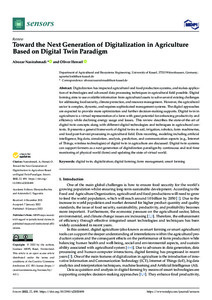Datum
2022-01-10Metadata
Zur Langanzeige
Aufsatz

Toward the Next Generation of Digitalization in Agriculture Based on Digital Twin Paradigm
Zusammenfassung
Digitalization has impacted agricultural and food production systems, and makes application of technologies and advanced data processing techniques in agricultural field possible. Digital farming aims to use available information from agricultural assets to solve several existing challenges for addressing food security, climate protection, and resource management. However, the agricultural sector is complex, dynamic, and requires sophisticated management systems. The digital approaches are expected to provide more optimization and further decision-making supports. Digital twin in agriculture is a virtual representation of a farm with great potential for enhancing productivity and efficiency while declining energy usage and losses. This review describes the state-of-the-art of digital twin concepts along with different digital technologies and techniques in agricultural contexts.
It presents a general framework of digital twins in soil, irrigation, robotics, farm machineries, and food post-harvest processing in agricultural field. Data recording, modeling including artificial intelligence, big data, simulation, analysis, prediction, and communication aspects (e.g., Internet of Things, wireless technologies) of digital twin in agriculture are discussed. Digital twin systems can support farmers as a next generation of digitalization paradigm by continuous and real-time monitoring of physical world (farm) and updating the state of virtual world.
It presents a general framework of digital twins in soil, irrigation, robotics, farm machineries, and food post-harvest processing in agricultural field. Data recording, modeling including artificial intelligence, big data, simulation, analysis, prediction, and communication aspects (e.g., Internet of Things, wireless technologies) of digital twin in agriculture are discussed. Digital twin systems can support farmers as a next generation of digitalization paradigm by continuous and real-time monitoring of physical world (farm) and updating the state of virtual world.
Zitierform
In: Sensors Volume 22 / Issue 2 (2022-01-10) eissn:1424-8220Förderhinweis
Gefördert durch den Publikationsfonds der Universität KasselZitieren
@article{doi:10.17170/kobra-202205066146,
author={Nasirahmadi, Abozar and Hensel, Oliver},
title={Toward the Next Generation of Digitalization in Agriculture Based on Digital Twin Paradigm},
journal={Sensors},
year={2022}
}
0500 Oax
0501 Text $btxt$2rdacontent
0502 Computermedien $bc$2rdacarrier
1100 2022$n2022
1500 1/eng
2050 ##0##http://hdl.handle.net/123456789/13816
3000 Nasirahmadi, Abozar
3010 Hensel, Oliver
4000 Toward the Next Generation of Digitalization in Agriculture Based on Digital Twin Paradigm / Nasirahmadi, Abozar
4030
4060 Online-Ressource
4085 ##0##=u http://nbn-resolving.de/http://hdl.handle.net/123456789/13816=x R
4204 \$dAufsatz
4170
5550 {{Landwirtschaft}}
5550 {{Digitalisierung}}
5550 {{Datenmanagement}}
7136 ##0##http://hdl.handle.net/123456789/13816
<resource xsi:schemaLocation="http://datacite.org/schema/kernel-2.2 http://schema.datacite.org/meta/kernel-2.2/metadata.xsd"> 2022-05-06T09:01:22Z 2022-05-06T09:01:22Z 2022-01-10 doi:10.17170/kobra-202205066146 http://hdl.handle.net/123456789/13816 Gefördert durch den Publikationsfonds der Universität Kassel eng Namensnennung 4.0 International http://creativecommons.org/licenses/by/4.0/ digital twin digitalization digital farming farm management smart farming 630 Toward the Next Generation of Digitalization in Agriculture Based on Digital Twin Paradigm Aufsatz Digitalization has impacted agricultural and food production systems, and makes application of technologies and advanced data processing techniques in agricultural field possible. Digital farming aims to use available information from agricultural assets to solve several existing challenges for addressing food security, climate protection, and resource management. However, the agricultural sector is complex, dynamic, and requires sophisticated management systems. The digital approaches are expected to provide more optimization and further decision-making supports. Digital twin in agriculture is a virtual representation of a farm with great potential for enhancing productivity and efficiency while declining energy usage and losses. This review describes the state-of-the-art of digital twin concepts along with different digital technologies and techniques in agricultural contexts. It presents a general framework of digital twins in soil, irrigation, robotics, farm machineries, and food post-harvest processing in agricultural field. Data recording, modeling including artificial intelligence, big data, simulation, analysis, prediction, and communication aspects (e.g., Internet of Things, wireless technologies) of digital twin in agriculture are discussed. Digital twin systems can support farmers as a next generation of digitalization paradigm by continuous and real-time monitoring of physical world (farm) and updating the state of virtual world. open access Nasirahmadi, Abozar Hensel, Oliver doi:10.3390/s22020498 Landwirtschaft Digitalisierung Datenmanagement publishedVersion eissn:1424-8220 Issue 2 Sensors Volume 22 false 498 </resource>
Die folgenden Lizenzbestimmungen sind mit dieser Ressource verbunden:
Solange nicht anders angezeigt, wird die Lizenz wie folgt beschrieben: Namensnennung 4.0 International
Verwandte Dokumente
Anzeige der Dokumente mit ähnlichem Titel, Autor, Urheber und Thema.
-
Organizing for Digital Innovation. Implications for Organizational Forms, Digital Transformation and Digital Innovation Units
Buch
Schumm, Max (kassel university pressKassel, 2023) -
Innovations and artificial intelligence along the energy industry value chain
Buch
Krebs, Heinz-Adalbert; Hagenweiler, Patricia (kassel university pressKassel, 2022) -
Industrial-age Ecosystems and Digital Innovation
Buch
Biedebach, Marius (kassel university pressKassel, 2023)


